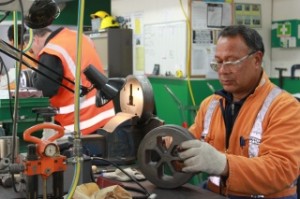Skilled training graduates deserve recognition
 Completing a high-level qualification while working fulltime requires a lot of dedication, yet every year several thousand employees in industry achieve highly with little public fanfare. Companies supporting their employees through on-job training are equally dedicated, investing in lifting transferable skill levels throughout New Zealand industry.
Completing a high-level qualification while working fulltime requires a lot of dedication, yet every year several thousand employees in industry achieve highly with little public fanfare. Companies supporting their employees through on-job training are equally dedicated, investing in lifting transferable skill levels throughout New Zealand industry.
To recognise the efforts of learners and employers, industry training organisation Competenz has published and distributed a ‘Roll of Honour’ handbook. The handbook celebrates all graduates who completed Level 4 or higher qualifications in 2011 within the engineering, baking, and food and beverage manufacturing sectors that Competenz works with.
A total of 846 graduates from 536 companies nationwide feature in the Roll of Honour. Graduates completed their national certificates in disciplines ranging from mechanical engineering, locksmithing, baking and fire protection apprenticeships, to competitive manufacturing, business first line management, quality management, rail operations and maritime qualifications.
“All of our graduates can be very proud of their achievements, knowing their skills will stand them in great stead for their career development,Ó says Competenz acting chief executive, Fiona Kingsford.
“Achieving a high-level, industry-based qualification requires just as much focus as anything youÕd study at university or polytechnic, with the added challenge of juggling work priorities.”
It’s a small way of recognising the time and effort learners put into completing their training, and the role of employers providing employees support throughout their on-job and off-job learning.
“Companies also deserve to be recognised for their commitment to invest in training a more highly skilled workforce with transferable skills benefits both the company and our country’s economic future.”
It’s a positive step toward meeting the skill gaps companies identified in research Competenz conducted last year on this issue. But according to the research, a further 3,600 skilled manufacturing workers will be needed by companies within these sectors by 2013.
“The only sustainable way for companies to gain the skilled staff they need is to upskill even more of their current employees, or take on new staff to train to your requirements,” says Mrs Kingsford.
“Training does require a big commitment, and industry training organisations like Competenz offer companies expertise in planning and training support to help meet their upskilling and business objectives.”
Competenz’s annual alumni magazine – ‘The Guild’ – has also been published to coincide with the handbook’s release. This latest edition features the inspirational stories of nine 2011 graduates, each with an interesting perspective on what drove them to complete a qualification on the job.
“These stories show that training positively impacts the lives and career prospects of people at all levels of work experience, and it’s never too late to get qualified in your field,” says Mrs Kingsford.



